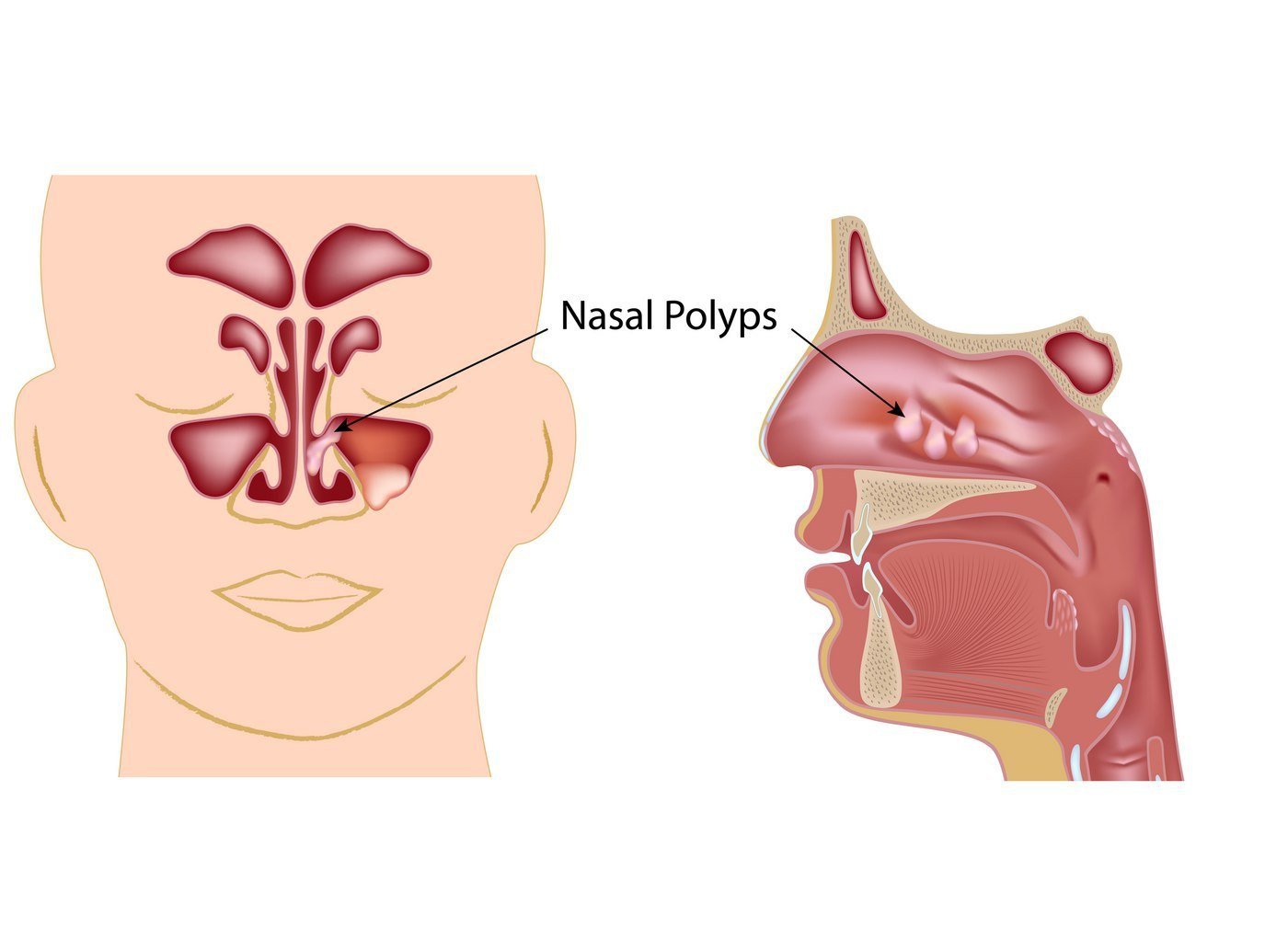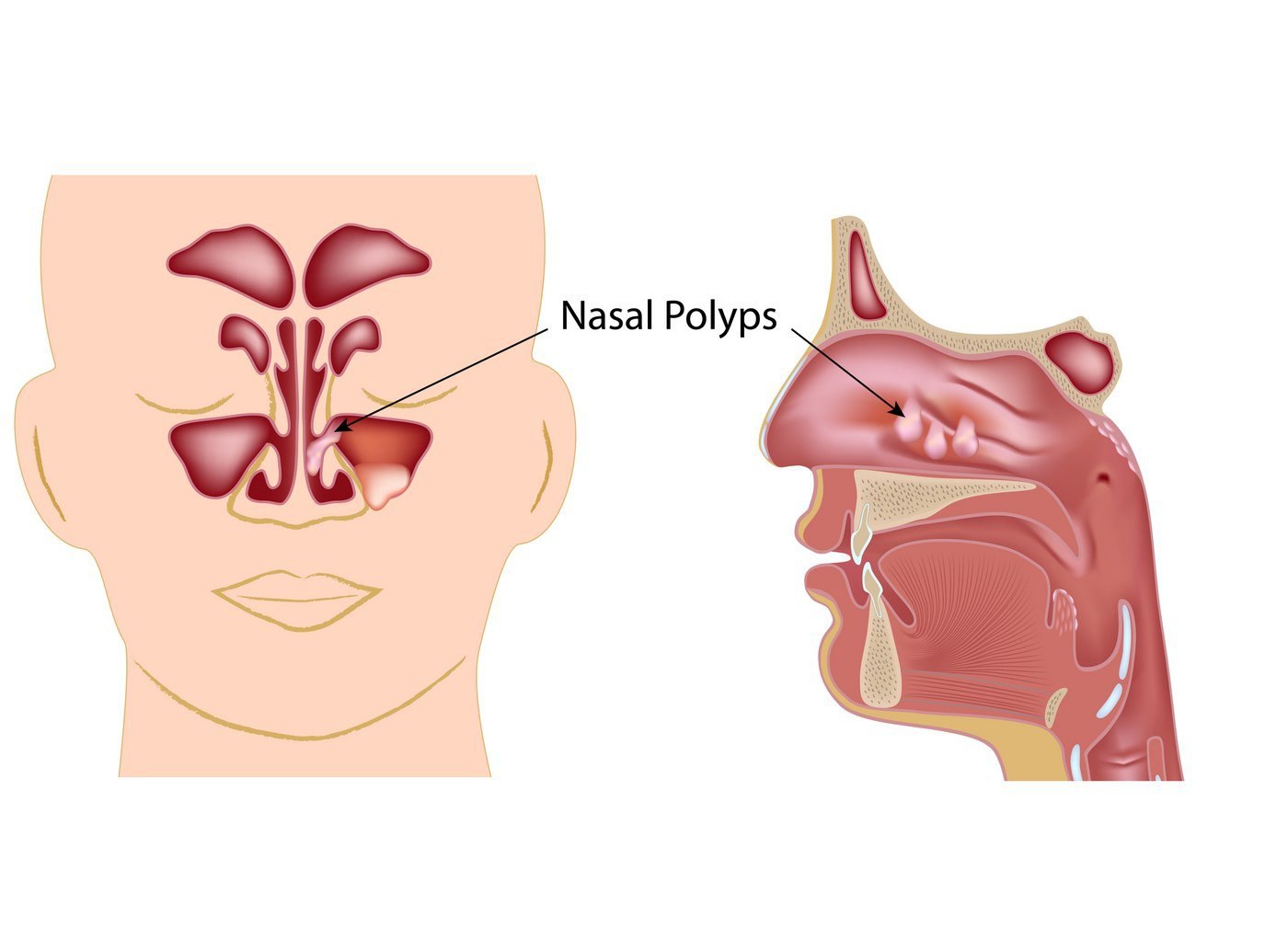What are Nasal Polyps? (Signs, Symptoms, and Treatment Options)
June 13th, 2022 | 4 min. read


Nasal polyps affect about four percent of the population, according to the National Center of Biotechnology Information (NCIB). It’s estimated that they are up to four times more common in men than women.
“How do I get nasal polyps?” That is probably the first question on the mind of everyone diagnosed with this medical condition. Unfortunately, there aren’t any clear answer for why some people get nasal polyps, why others do not, and what exactly it is that causes some people to be more susceptible to them than others.
What we do know is that young and middle-aged adults are the most commonly affected by nasal polyps. Some people appear to be more likely to get these polyps, including people who have:
-
Hay fever
-
Sensitivity to aspirin
-
Chronic sinus infections
-
Cystic fibrosis
People who have long-term nasal swelling, inflammation, and/or irritation due to allergies in Houston, chronic infections, or asthmas seem to be the most likely candidates, though even if you don’t have these conditions, you can still develop nasal polyps.
What are Nasal Polyps?
If you’re looking for a nasal polyps definition, the closest you’ll find is this: “benign growths along the interior lining of your nose.” The reality of nasal polyps is a little more complicated.
The polyps themselves are soft and painless and often look like tiny teardrops or grapes hanging inside your nasal cavity. While small polyps may never cause you a day’s trouble, larger polyps or even groups of polyps can result in the blocking of your nasal passages with consequences of their own, such as:
-
Difficulty breathing. By blocking your nasal airways, they are inhibiting your ability to breathe through your nose.
-
Diminished sense of smell. While the loss isn’t permanent, it may remain as long as the polyps continue to block your airwaves.
-
Frequent nasal/sinus infections. While infections themselves may be at the heart of your polyp problem, they can also lead to even more frequent infections.
The good news is that the polyps aren’t painful to the touch. Unless they’ve become irritated due to infection or other things. The bad news is that they often return, even if they’ve been successfully treated and removed.
Signs and Symptoms of Nasal Polyps
Some nasal polyps signs are easy to recognize if the polyps are visible. Another possible sign of nasal polyps is a lingering case of sinusitis, one lasting 12 or more weeks. While this isn’t definitive proof, it does indicate there may be something more than simple sinusitis in play.
Some people experience various nasal polyps symptoms long before the first signs of trouble. Symptoms of chronic sinusitis with nasal polyps include the following:
-
Diminished sense of taste
-
Facial pain
-
Headaches
-
Itching around your eyes
-
Lingering stuffiness
-
Loss of smell
-
Mouth breathing
-
Nasal congestion
-
Postnasal drip
-
Pressure over face and forehead
-
A runny nose producing clear or colored mucus
-
Sleep apnea
-
Snoring
-
Upper tooth pain
If you’re experiencing these symptoms, it’s always wise to consult your physician and consider booking an appointment with your Houston ENT to try to determine if your condition may require further treatment.
Seek immediate medical attention if you are having serious difficulty breathing, experiencing worsening symptoms, have double or reduced vision, severe swelling in the area around your eyes, or a headache that is increasingly severe and coincides with a high fever.
interested in seeing an ENT Specialist near you for nasal polyps?
Diagnosing Nasal Polyps
Diagnosing nasal polyps may involve several different measures depending on your physician. While your general practitioner may recommend a general health exam, including an examination of your nose, as some polyps are visible with the right tools. Your doctor may require additional testing, though, including:
-
Allergy tests. Allergy skin tests can be used to determine if allergies may be contributing to chronic inflammation which can contribute to the development of nasal polyps.
-
Cystic fibrosis testing. If your child is diagnosed with polyps this may be the next test your physician orders since CF is a common contributing factor for nasal polyps.
-
Imagine studies. CT scans can help doctors locate nasal polyps locate deeper within the sinuses and determine how extensive your inflammation may be. It can also be instrumental in ruling out the potential for other growths or problems that could affect your health and your ability to breathe.
-
Nasal endoscopy. The inserting a lighted tube equipped with a nasal endoscope that allows your doctor to examine the inside of your nose and sinuses.
Once nasal polyps are officially confirmed and diagnosed, you can begin working with your ear, nose and throat specialist to develop a treatment plan that you’re both satisfied with.
Treatment Options for Nasal Polyps
You have a variety of nasal polyps treatment options ranging from medications to surgery.
Medications for Nasal Polys
The first line of defense, unless nasal polyps are causing significant disruptions to your ability to breathe is to seek treatment through medications. This often comes in the form of nasal corticosteroids designed to reduce inflammation in the nasal passages by shrinking or eliminating the polyps completely.
Your physician may also recommend drugs to treat chronic inflammation in your nasal passages and sinuses. These may include antibiotics to treat a chronic or recurring infection and antihistamines to treat allergies. Some patients with nasal polyps and aspirin sensitivity may benefit from aspirin desensitization therapy.
Injectables for Nasal Polyps
If oral medications don't provide immediate relief, your physician may order injectable corticosteroids, like prednisone. These are usually used in combination with nasal sprays in hopes to reduce the swelling. Because the side effects of these types of medication can be serious, they are usually only prescribed for limited amounts of time.
Surgery for Nasal Polyps
While medications can shrink nasal polyps and eliminate them in some cases, if these treatments do not work, surgery remains an option. The primary type of nasal polyp surgery consists of endoscopic sinus surgery performed on an outpatient basis.
To remove any nasal polyps, your ENT physician uses a small nasal telescope, and lances the polyp. If you have surgery to remove your polyps, plan to continue using corticosteroid nasal sprays afterward in an effort to prevent nasal polyps from returning. You can go home the same day as your nasal polyp removal surgery.
VivAER NASAL AIRWAY REMODELING PROCEDURE
Today, with the Vivaer procedure, you have another option available. Your nasal valve area (often the main region involved in nasal blockage) can be opened up during your brief office visit.
The Vivaer treatment uses a device that applies low-temperature radio-frequency energy for contracting and tightening the cartilage and tissue in your nose. It reshapes your nasal valve area, allowing for better airflow. You'll experience a noticeable improvement in your nasal breathing immediately
Nasal Polyps Prevention
Other preventative steps you can take to reduce reoccurrences include:
-
Using nasal rinses, such as a saline rinse.
-
Humidifying your home.
-
Avoiding nasal irritants.
-
Managing your allergies or asthma according to physician instructions.
Getting Diagnosed and Treated for Nasal Polyps
Whether this is your first round with nasal polyps or you’re becoming an old pro, it never hurts to seek expert advice about your next move. Work with your Houston ENT to determine if your polyps could be problematic and if treatment through one or more of the methods above is advisable.
Request an appointment at Houston Ear, Nose and Throat Clinic, LLP for nasal polyps by calling 281-649-7000 or completing our online form.
Dr. Patricia Maeso is an Otolaryngologist who specializes in Rhinology. She has extensive experience and specialized training in the diagnosis and treatment of nasal and sinus disorders. Her subspecialty in Rhinology positions her as a leading expert in the advanced treatment of sinus conditions.
Topics:

